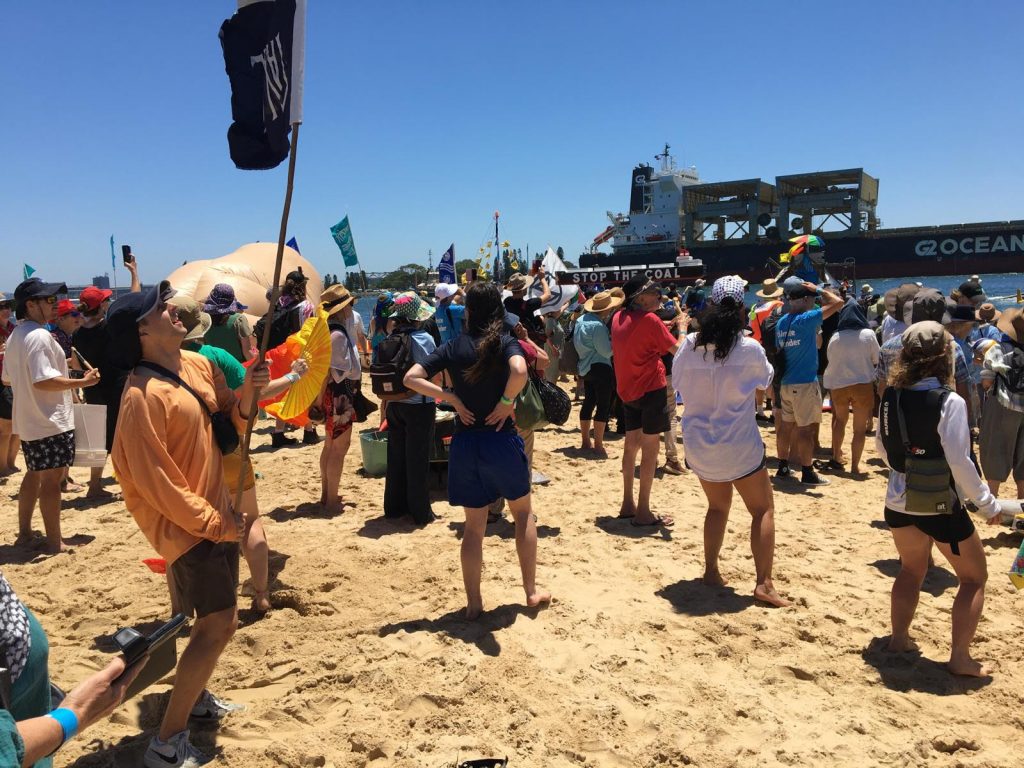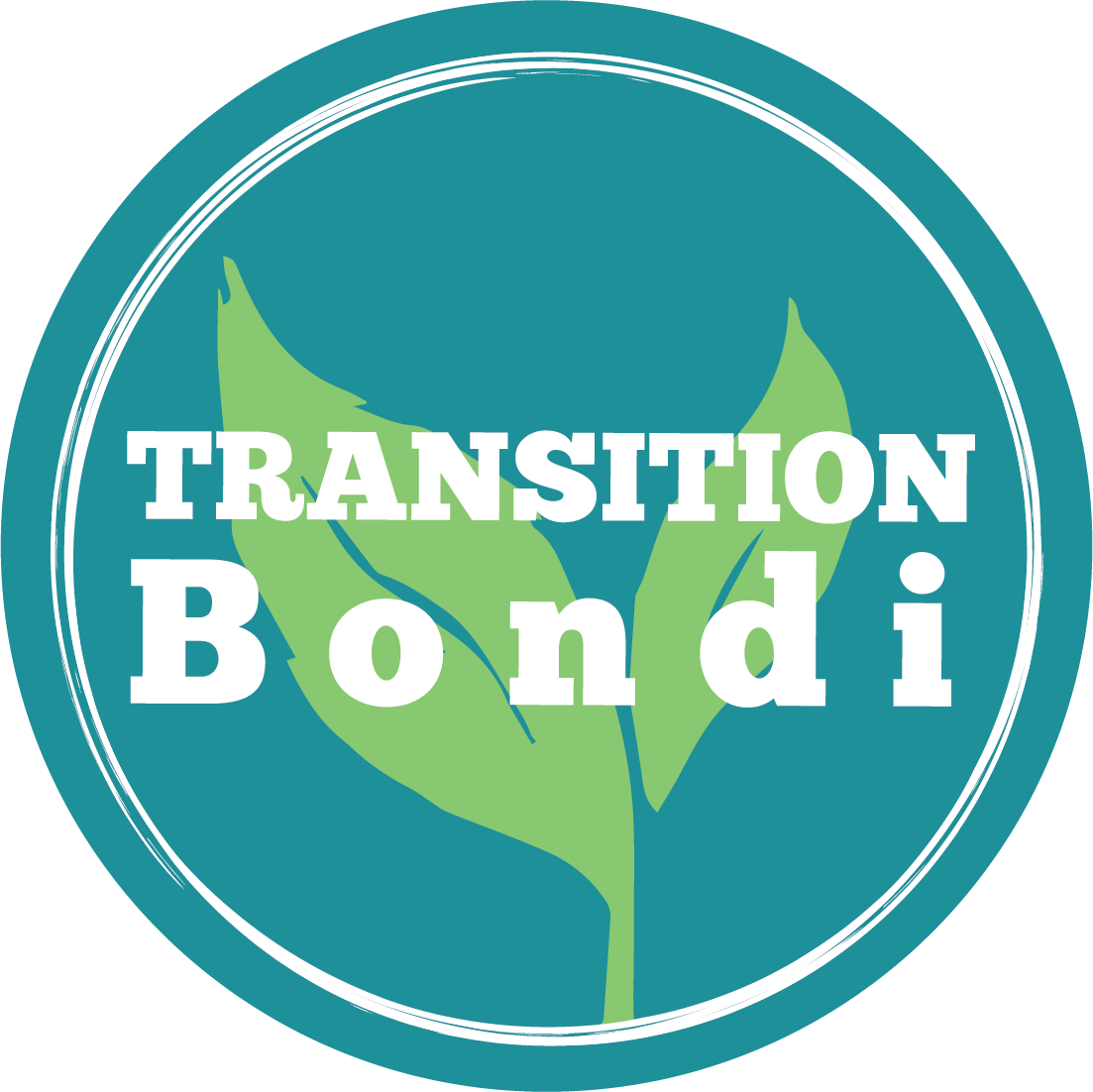REFLECTIONS ON THE NEWCASTLE BLOCKADE – a personal account
I hadn’t been to a long festival before, and this one – a Protestival – got me in. And it was a terrific! Rising Tide is a highly functioning mass movement, with a long history, and following in the tradition of other non-violent social change activism (see below).
My main interest was to see how a large number of people get organized to act together at such a protest. And there was big action with kayaks en masse heading out into the harbour in shifts, day and night, with encouragement from the colourful crowds on the beach – chanting, singing, drumming. Some people planned to get arrested, to bring publicity, and over 170 did just that. The result was good!
And all this was organised by highly functioning teams, with months of workshops and meetings in the lead up: non-violent direct action trainings, legal briefings and establishing a system of buddies and support groups, with layers of representatives passing decisions upward.
The day to day experience as a participant at the site was an immersion in a hive of human connection. It felt like a village, where you could linger in conversation with everyone that you met. All of us were encouraged to sign up for the many volunteering jobs that kept the camp running smoothly – including cleaning toilets to hosting chai stalls, kitchen prep, First Aid and daily waste management. The heart of the work was carried out by layers of organisers, like the media team, police liaison, volunteer co-ordination, welcome desks and many more. Fun and connection were the life-blood, and clusters of people were to be seen all day and night, enjoying the atmosphere, talks and conversations right across the wide park area.
Messaging systems on our phones allowed for instant sharing of information and calling for action or to gather. It felt like being a cell in a large organism.
The values and structure of the organisation were visible in all aspects of the event – inclusion, diversity, self-discipline, respectful communication, generosity of spirit, valuing difference, creativity, hard work and endurance, and an emphasis on fun and keeping things buoyant. Indigenous leadership framed most meetings and we were made aware of the context and history of the place.
My close support group at the blockade was an organisation called Sustaining All Life and I was one of their team who presented workshops about the power of listening in movement-building. Listening can be understood as a healing tool, providing the space for another person to express and release feelings that might otherwise bubble over inappropriately in our social lives, or remain trapped in our minds. SAL put the perspective that unreleased painful feelings (fear, grief, frustration, on this topic) can drain our energy and interfere with our ability to bring our full intelligence to bear on the world around us.
This perspective sees also that as well as unhealed personal injuries setting us back, we are conditioned by the social hurts of our society; the oppressions of sexism, classism, racism etc These hurts arise from the inherent hierarchies of power (men over women, white over non-white, owning class over those at the lower end of the socio-economic ladder). And these unhealed hurts separate us individually and in our groupings. This makes it hard for us to collaborate across difference and build social movements for change.

The Peoples Blockade of the World’s Largest Coal Port, November 2024
(from The Rising Tide Handbook)
In the face of Supreme court ruling to prevent boats going into the shipping channel, and the prospect of a rail-strike, Rising Tide stood steady and fulfilled its plan to bring publicity to the fact that the Port of Newcastle is the biggest coal port in the world and Australia’s single greatest contributor to the climate crisis. When burnt, the coal exported from Newcastle is approximately 1% of global carbon emissions.
Rising Tide movement has three DEMANDS:
- That the government immediately cancel all new fossil fuel projects
- Tax fossil fuel export profits at 75% to fund community and industrial transition and pay for climate loss and damage
- End all coal exports from Newcastle by 2030
The STRATEGY is civil disobedience by a growing national movement, to challenge the social licence of Newcastle’s coal export industry.
Rising Tide was the first direct action climate group in Australia, active in Newcastle from 2005 until 2012, when members became involved in climate research and other climate campaigns. In 2022 it relaunched with a new vision for rapid, transformative change, which culminated in the People’s Blockade in November 2023, attended by 3000 people who gathered to blockade the Newcastle coal port for over 30 hours.
This year, in November, a bigger gathering escalated the campaign; around 7,000 attended.
The movement holds these VALUES:
Justice – given that the climate crisis is an injustice perpetrated by the powerful few on the rest of humanity and life on Earth. Rising Tide supports seeking solutions that don’t leave workers and communities behind
Care – for humans, other species and the natural world; for ourselves and each other
Community – working together in supportive relationships, including fun, sharing food, stories, music and art
Courage – in the face of the climate crisis; standing against powerful vested interests to defend our climate and all that depends on it
Impact – using strategic planning and a pragmatic attitude, remaining true to the values of the organisation
Based on Social Movement Theory and lessons from history (for example the Civil Rights movement, Black Lives Matter, the Franklin River campaign) Rising Tide uses three key FRAMEWORKS:
- The overall Strategy is to target the main driver of the climate crisis – the burning of fossil fuels, by using civil resistance, the ‘sustained nonviolent, escalatory use of disruption by ordinary people to win against injustice’.
- The strategy is supported by compelling Storytelling, and exposing of lies, to win public support and erode the opponents’ social licence. The attitudes and behaviour of groups who participate are a powerful part of being persuasive: diversity, worthiness (deserving of respect), unity, numbers and commitment.
- To increase the Momentum and build the social movement, deep organising is required, to support disruptive, non-violent actions.
The internal culture of the group – the way people treat each other – is guided by these principles:
· Assume good intent, tolerate and correct mistakes
· Avoid creating defensiveness through harsh feedback or criticism, build trust through kindly challenging, if necessary
· Have a growth mindset – be receptive to constructive feedback rather than avoiding conflict
· Challenge our privilege to overcome structural oppression.
· Organise for diversity – ask ‘who is missing’; affirmative action
· Leaderfulness – leaders empower others, not dominate; formal roles can both empower and hold leaders accountable
· Prioritise systemic change, be inclusive
· Mutual aid rather than one-sided, private gain.
There is a structure for groups and meetings, with clearly outlined decision-making principles


